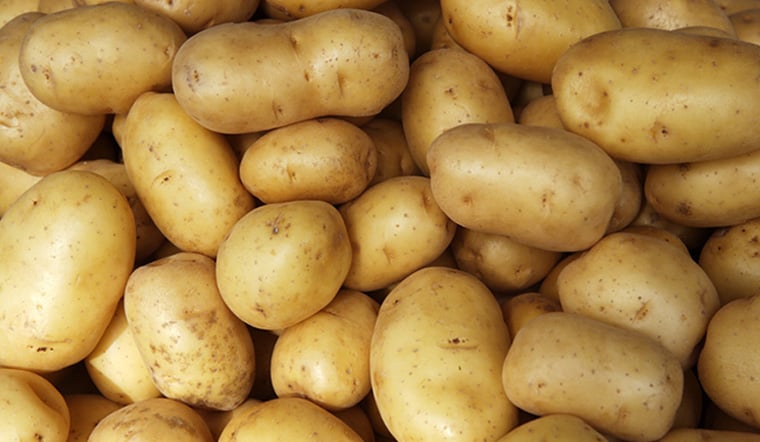General information about potatoes
Potatoes are a type of underground tuber that grow on the roots of the potato plant, known scientifically as Solanum tuberosum. This plant belongs to the Nightshade family, which also includes tomatoes and tobacco plants.
Potatoes originated in South America and were later introduced to Europe in the 16th century. They are now grown in countless different varieties all over the world.
In addition, potatoes are a versatile vegetable that is relatively inexpensive, easy to grow, and easy to care for. They are also highly nutritious, which is why many households in Vietnam choose potatoes as a staple food in their daily meals.
Potatoes can be prepared in various ways, including boiling, frying, baking, and are often used as a favorite snack by many people.

Nutritional composition of potatoes
Potatoes are a healthy food, although the benefits they provide in a diet depend on factors such as preparation method, combination with other foods, or storage conditions… Potatoes in their natural form are relatively low in calories. In addition, they provide important nutrients such as vitamin C, vitamin B6, and minerals.
A 100g serving of potatoes contains the following nutrients: 94 calories; 0.15g fat; 0g cholesterol; 21.08g carbohydrates; 2.1g fiber; 2.10g protein; 10mg calcium; 0.64mg iron; 27mg magnesium; 75mg phosphorus; 544mg potassium; 12.6mg vitamin C; 0.211mg vitamin B6; 38mcg folate… Additionally, potatoes provide niacin, choline, and zinc.
Raw potatoes contain very little sodium, only 10mg per 100g. However, this is in contrast to processed potato products, such as french fries, which have a higher sodium content.
Potatoes also contain a compound called alpha-lipoic acid (ALA), which helps the body convert glucose into energy. Some evidence suggests that alpha-lipoic acid may help control blood sugar levels, improve vasodilation, protect against macular degeneration in diabetic patients, and preserve brain and nerve tissue.
Quercetin is a flavonoid found in potato skins, and it has anti-inflammatory and antioxidant effects, protecting the body’s cells from damage by free radicals. Potatoes also contain vitamin C, which acts as an antioxidant. The role of antioxidants can help prevent cell damage and cancer, as well as promote a healthy digestive system and cardiovascular function. The fiber in potatoes plays a role in maintaining a healthy digestive and circulatory system.

Health benefits of potatoes
Cardiovascular health
Potatoes are rich in fiber, potassium, vitamin C, and vitamin B6, all of which support cardiovascular health. Potatoes are a food that contains a significant amount of fiber. Fiber plays a role in reducing total cholesterol levels, thereby reducing the risk of heart disease. NHANES-based research has found a correlation between higher potassium and lower sodium intake with reduced risk of death from heart disease.
Blood pressure
A low sodium content is extremely important for maintaining healthy blood pressure, but an adequate amount of potassium is equally important. Potassium is a vasodilator, meaning it helps expand or dilate blood vessels.
According to the National Health and Nutrition Examination Survey (NHANES), around 2% of American adults meet the recommended 4,700 milligrams per day.
In addition, minerals such as potassium, calcium, and magnesium are found in potatoes. These minerals have been shown to naturally lower blood pressure.
Bone health
The minerals iron, phosphorus, calcium, magnesium, and zinc in potatoes help build and maintain the structure and strength of bones. Additionally, iron and zinc play important roles in the production and maturation of collagen.
Phosphorus and calcium are both important for bone structure, but it is important to balance these two minerals for proper bone mineralization. Too much phosphorus and too little calcium can lead to bone loss and contribute to osteoporosis.

Digestion
The fiber content in potatoes helps prevent constipation and promotes regularity in a healthy digestive system.
Weight management and satiety
Fiber is often recognized as an important factor in weight management and weight loss. It acts as a bulking agent within the digestive system. With this activity, it increases the feeling of fullness and reduces appetite. Therefore, when consuming potatoes, you will feel full longer and are less likely to consume more calories.
Metabolism
Potatoes are an excellent food source of vitamin B6. This vitamin plays an important role in the energy metabolism process by breaking down carbohydrates and proteins into glucose and amino acids. These are simple compounds that the body can easily use to create energy.
Immunity
Some studies have found that vitamin C can help reduce the severity and duration of the common cold. Potatoes are a plentiful source of vitamin C.
Notes when using potatoes
– Don’t discard the skin: It is generally mistaken that all the nutrients in potatoes are in the skin. While potato skins contain approximately half the fiber, the majority (>50%) of the nutrients are found inside the potato.
– In fact, as with many vegetables, cooking affects the existence of nutrients inside, especially vitamins, water-soluble minerals, and nutrients that are lost when cooking with water. To retain most of the nutrients in cooked potatoes, steaming or using the microwave is the best method.
– You may have noticed that when storing potatoes at very low temperatures, they can turn black or gray when cooked. To prevent this, store potatoes at a temperature between 45°F and 55°F (7.2°C and 10°C). Never eat sprouted potatoes as they can cause toxicity, low blood pressure, and other symptoms.
Potatoes are a nutritious and versatile vegetable. They are a good source of vitamin C, vitamin B6, fiber, and minerals such as potassium, calcium, and magnesium. Potatoes also contain compounds like alpha-lipoic acid and quercetin, which have potential health benefits. In their natural form, potatoes are relatively low in calories.
Potatoes are rich in fiber, potassium, vitamin C, and vitamin B6, all of which contribute to cardiovascular health. The fiber in potatoes helps reduce total cholesterol levels, thereby lowering the risk of heart disease. Additionally, research suggests that a diet high in potassium and low in sodium can reduce the risk of death from heart disease.
Potatoes are naturally low in sodium and high in potassium, both of which are important for maintaining healthy blood pressure. Potassium acts as a vasodilator, helping to expand and dilate blood vessels. According to the NHANES survey, only around 2% of American adults meet the recommended daily intake of potassium (4,700 mg).
Potatoes contain minerals such as iron, phosphorus, calcium, magnesium, and zinc, which are essential for building and maintaining strong bones. Additionally, iron and zinc are involved in collagen production and maturation, further supporting bone health. However, it is important to balance phosphorus and calcium intake to ensure proper bone mineralization.
The fiber content in potatoes helps prevent constipation and promotes a healthy digestive system by adding bulk to stools and improving regularity.
Yes, the fiber in potatoes can contribute to weight management by increasing feelings of fullness and reducing appetite. This can lead to consuming fewer calories overall.
Potatoes are a good source of vitamin B6, which is essential for energy metabolism. Vitamin B6 helps break down carbohydrates and proteins into glucose and amino acids, providing the body with a simple source of energy.
Yes, potatoes are a good source of vitamin C, which has been shown to reduce the severity and duration of the common cold, thereby supporting the immune system.
It is a common misconception that all the nutrients in potatoes are in the skin. While the skin contains fiber, the majority of nutrients are found inside the potato. Cooking methods can affect nutrient retention, with steaming or microwaving being the best methods to retain nutrients. Additionally, store potatoes at a temperature between 45°F and 55°F (7.2°C and 10°C) to prevent them from turning black or gray when cooked. Avoid eating sprouted potatoes as they can cause toxicity and other health issues.





































